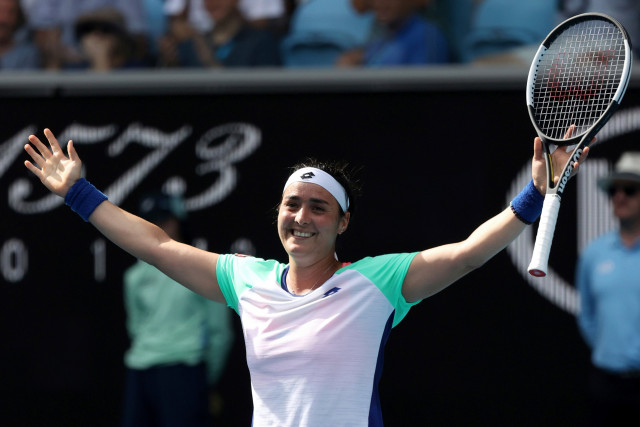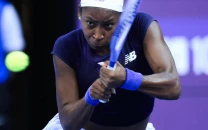Ons Jabeur dreams of gold in Tokyo
Tunisian trailblazer hopes to inspire more young Arab women to take up tennis

Ons Jabeur intends to fly the flag for Tunisia and beyond at the Tokyo Olympics, hoping to inspire more young Arab women to take up tennis, especially in North Africa.
The two-time Grand Slam quarter-finalist is preparing for her third appearance at the Games, and will arrive in Japan a much improved player from the one who suffered first-round exits in 2012 and 2016.
"I've been preparing for the Olympic Games since Roland Garros (in June)," Jabeur, ranked a career-high 23rd, told AFP from her training base in Tunis.
"I have to stay focused, especially since I know lots of Tunisians expect the best from me at the Games against the best players, in matches that will be very difficult."
Jabeur, 26, will meet cancer survivor Carla Suarez Navarro of Spain in her opening match at Ariake Tennis Park, with Wimbledon runner-up Karolina Pliskova a potential second-round opponent.
"I'm ready for this challenge. The gold medal in Tokyo is my dream. What I am most proud of is representing Tunisia," said Jabeur.
"The Grand Slams are important, but the Olympics are something special, and I say to Tunisians that I'm going to give everything on the court for you.
"My position in the tennis world is not the same as other players because I'm representing Tunisia, Arabs and Africa at the same time, and it's something of which I'm very proud," she added.
"There are lots of players who come from France, Australia, the United States, and I'm proud to represent an entire nation on my own."
Jabeur broke into the top 50 last year following her run to the last eight of the Australian Open, where she became the first Arab woman to reach the quarter-finals of a major in the Open era.
She was hailed as "an example for women and young people" by Tunisian president Kais Saied following that breakout performance, which came almost a decade after she won the French Open junior championship in 2011.
"I've learned from my mistakes. In 2019, I told my team I'd had enough of being ranked 60th and that I wanted to be among the best players in the world," said Jabeur.
"When I got to the Australian Open quarter-finals, I gained more experience and confidence and that allowed me to better prepare for tournaments. The other players have started to fear playing me."
Jabeur made history as the first Arab woman to win a WTA tournament on the eve of Wimbledon, defeating Daria Kasatkina on grass in the Birmingham Classic final.
Her success has helped in part lift the gloom of Tunisia's political and health crisis. The country has been overwhelmed by Covid-19 cases, including nearly 18,000 people who have died in a nation of 11.7 million.
Jabeur recently auctioned a racquet to raise funds for local hospitals, which have faced acute shortages of oxygen, staff and intensive care beds.
"It was my duty to help my country when it needs it. We were able to collect 75,000 dinars, around $27,000, to buy equipment for the hospitals that lack it," she said.
While Jabeur aims to drive up participation rates in the sport back home, she still has plenty goals of her own to achieve.
"My dream since childhood is to win titles in the big competitions, and I know very well that I'm not far off," said Jabeur, whose husband Karim Kamoun is also her fitness trainer.
"I always say nothing is impossible, you have to work, rely on yourself and have confidence in your abilities.
"During my career, plenty have doubted my ability to ever reach this level, but my belief in myself and my work have allowed me to move forward."



















COMMENTS
Comments are moderated and generally will be posted if they are on-topic and not abusive.
For more information, please see our Comments FAQ